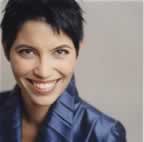
Oh dear, I seem to have acquired a new stage crush. Went to see Handel's Semele at City Opera on Wednesday and became completely obsessed with Vivica Genaux, who sang the dual parts of Ino and Juno. Summoning all my critical faculties and the immense vocabulary at my disposal, I'll offer the following assessment: She's hot hot HOT!
This production of Semele should be forced upon everybody who thinks opera is boring—a more entertaining evening is hard to find in town (at least on that particular Wednesday night, since the performance I caught was the last one). Director Stephen Lawless transposed the action to the early 1960s, with Semele as Marilyn Monroe, Jupiter as JFK and Juno as Jackie K. It was a masterstroke because it fit the plot so perfectly : Ambitious Semele dumps her sensitive (read: countertenor) fiancé for powerful alpha male (duh, he's a god!) Jupiter; meanwhile, jealous Juno tricks Semele into committing a fatal mistake (represented in the show by a pill overdose). The whole thing zipped along for its entire three-hour length, with Lawless always striking a perfect balance between humor and genuine pathos. Sure, Elizabeth Futral didn't sound all that comfortable at times in the title role ("The morning lark to mine accords his note/And tunes to my distress his warbling throat"—warbling throat indeed!) but she barreled through on sheer personality and by acting up a storm. But my heart was stolen by Vivica, who not only looked, er, what I said before, in her little pillbox hat, but also sang rings around La Futral.
Reviewers and bloggers seem to suggest Vivica was mugging and making faces. I have to disagree. The thing, you see, is that technically speaking nothing much happens in a baroque aria. Most of them repeat 2-3 sentences over and over, sometimes in their entirety, sometimes in fragment. (As an aside, I've been musing about how great it'd be if contemporary musical-theater composers took their cues from that style instead of coming up with all these cumbersome, narrative-heavy dirges. I'll refine this thought in a further post.) In addition, and particularly in a case like Semele, it's friggin' impossible to follow the plot without a synopsis because the opera's so elliptical. In order to get the plot moving—and even clarify what was going on—Lawless had those onstage but not singing during an aria move around and, yes, act. Act! Has this become anathema at the opera?!? It made sense for Vivica to act while someone else sang as a way to express what her character was thinking/feeling at any given time, and she never did it in a way that distracted from whatever else was going on; it was just a nice little treat to those paying attention, and it made dramatic sense. It's called reactive acting, people! Too many lazy theater and opera directors focus only on whoever singing/speaking at any given time, leaving those sharing the stage to just stand there. How lazy can you get? Directing doesn't involve only coming up with basic blocking and telling whoever's in the foreground "Now you pretend to be sad/happy/frustrated/angry." Lawless had a concept that fit the opera, then he had his actors interact. Is it so rare nowadays that it can be misinterpreted as making faces?




No comments:
Post a Comment